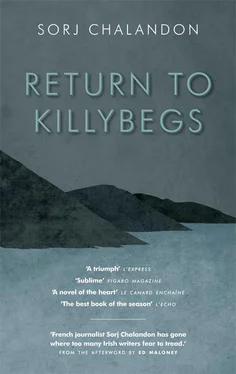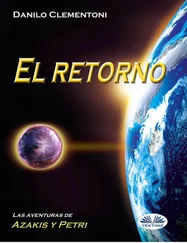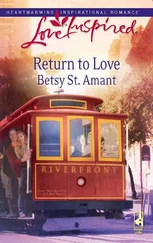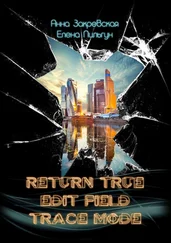— That we know, the priest smiled.
The driver switched off the radio. Silence fell over us again. I was finding it harder and harder to breathe. I watched the schoolgirl, the youth, caught a glint in the woman’s eyes. I wondered whether they knew. If all of them knew. If the news had spread from street to street as far as the port. If, on leaving my place last night, the Bear Cub and O’Doyle hadn’t stirred up the entire city. I smiled at the child. The young mother returned the favour. That graveyard quiet was for me. When I got into the car, everyone had been talking, I was sure of it. I think I even saw Father Adam turned around in his seat, laughing with the others. Now, we were stiff. A car full of statues.
We passed by the Sinn Féin headquarters, Falls Park, the Royal Victoria Hospital. The schoolgirl turned and tapped lightly on the glass partition with a twenty-pence piece. The taxi stopped. I met Brendan’s eyes in the rear-view mirror. I knew that look. That contempt reserved for the enemy. I smiled at him, a wink accompanied by a slight nod. It was a habitual gesture, a sign of complicity. He didn’t respond. Then he had some trouble changing gear. The engine protested violently.
— Bollocks! the driver responded.
The priest slapped him on the shoulder.
— Brendan!
— Sorry, Father, it slipped out.
His eyes brushed mine with a furtive glance, then cut me off again, his gaze locked on the rain.

I got off at Milltown Cemetery. On my way past the florist, I bought a bunch of dried flowers. I walked over graves, over friends. In the Republican patch I gave two yellow daisies to the hunger strikers, and one to Jim O’Leary, the great ‘Mallory’, our bomb-maker and my friend, who had died for Ireland on 6 November 1981.
Then I laid my flowers at random, like a child dropping pebbles for fear of getting lost. I murmured a word each time. Standing very straight, an old soldier at attention. Goodbye, Bobby. Goodbye, Jim. I sat for a moment at Tom Williams’s grave with its tragic headstone.
The clouds were hugging the hills tightly. The rain was scratching black on the sandstone statues. A glimpse of sunshine, three rays of light. Then the darkness once more. The sky closed up again like a gloomy curtain.
I went to the railing. I turned around. I said farewell to Milltown.
On the other side of the Falls Road is the municipal cemetery. A place of rest without this common history. There you die in grey, not in tricolour. The heads are lowered, the hearts don’t lift. Over there, they bury those who aren’t our men. And it is there that I will go because I am an other.

At nightfall, I decided to give myself in to the IRA.
Sheila was waiting for me when I got home, sitting in my armchair. The television was switched off, its silence hit me. I stayed standing, a last daisy in my hand. The flower was like me, its head drooping. Sheila got up. I handed it to her. I was going to speak, she pressed the end of her fingers to my lips. No lie. We had agreed on truth or silence. Silence suited her. I was going to go upstairs, gather a few bits of clothing. My bag was sitting against the armchair; she had already packed it. She didn’t know anything, but she suspected everything. On top was some money, an egg and onion sandwich and a bottle of water.
And the key to Killybegs.
The living room was dark, and the curtains were pulled. Sheila hadn’t turned on the little lamp that sat on the dresser, with ‘Paris’ written on the midnight-blue base. She slipped a photo from our bedroom wall into my coat pocket, the three of us smiling, with Jack aged six wearing a black, plastic London-Bobby cap. Then she retied my scarf. She handed me the woollen gloves that I’d left on the table by the front door. For one moment, I was afraid she would cry, but she didn’t. Not that, not in front of me. She even wore a pale smile, the gift to the dying man on his sickbed. I embraced her. She gently pushed me away, then took my hands. She kissed them, one after the other, her eyes looking deeply into mine. She sighed, fished for something in her cardigan pocket. She handed me the rosary my mother had used for praying, the black beads shiny like lead pellets.
Mother died in Drogheda during the night of 29 September 1979 with a smile on her lips. Up at five that morning, she had made it to the Phoenix Park where Pope John Paul II was to speak.
Baby Sara was forty years old, she had entered the St Teresa convent in County Meath. With the wee Sisters of the Visitation, she had made the journey by car and invited Mother to join them in prayer. The weather was glorious. They had prayed together under the sun.
In the evening, Mother had returned in a feverish state. She was praying in a low voice. Since she’d been living alone, neighbours used to visit her before she went to bed, taking it in turns. That evening, Mother had dressed herself for leaving. She had put on her Sunday best, black dress with a white collar, slipped on lace gloves and her patent-leather shoes. She lay down on the bedspread, the portrait of the Virgin against her chest and two candles lit on the ground. Her rosary lay on the night table, tucked into a blue envelope.
For Sheila Meehan, who will have need of it , Mother had written.
The neighbour had found her like that. The doctor said that she hadn’t died of anything. She was dead, and that was all.
— To die, all you have to do is ask, my mother often said.
When I opened our front door to leave, Sheila didn’t move.
Don’t turn around, Tyrone. Don’t look at another thing. Close your life without any noise. The night. My street. My neighbourhood. The first drunks making a racket in the distance. The litter being plastered against my legs by the wind and rain. The smell of Belfast, that delicious nausea of rain, earth, coal, darkness and misery. All that silence won back in the absence of weapons. All that peace returned. I passed my local pubs, my tracks, my footsteps. I pushed open the gate to the square where the memorial to the 2nd Battalion of the Belfast Brigade had been erected. The flag took the wind as though flying from a ship mast. On the black marble was the list of our martyrs.
Vol. Jim O’Leary
1937–1981
Killed in action
I said his name aloud. And the others as well.
Engraved silhouettes stood either side: two IRA soldiers, heads high, hands resting on their rifle butts, a canon at their feet. With a finger, I stroked the stone to hear it. When I was a child I would listen, palm against the bark, to my father’s old elm tree and huge fir tree. I used to question the warm, blackened bricks of the fireplace, and the greasy pine that covered Mullin’s. I believed I was a sorcerer.

I rang. Mike O’Doyle opened the door. He saw my bag. He nodded.
— I’m coming, he told me.
He didn’t ask me in.
Through the open living-room door, I could hear him making a phone call. Abbie, my wee goddaughter, half-opened the curtain. She must have been kneeling on the couch. She saw me, recognized me, gave me a little wave, smiling.
— It’s Tyrone!
I could read my name on her lips.
Mike was facing the wall, telephone at his ear. He was pulling on his jacket with one hand. The wee one tapped the windowpane with her finger. She signalled me to come in, beckoning with her fingers. I shook my head. No, sweetheart. It’s late. I can’t. I pulled her favourite funny face, hand miming a telescope at my eye and a pirate’s grin filled with my ruined teeth. She laughed, turned around to tell her father. He raised a hand impatiently. Then she opened the curtain more. With a sweeping gesture, she showed me the Christmas tree that was set up in the corner of the room. It was twinkling slowly. I smiled, held back a sob. What a beautiful Christmas tree, wee Abbie. I stuck my thumb up. She clapped. Mike put away his mobile phone. He came over to his daughter, looked at me. Him in that warmth, that happiness so violent. And me in my frozen night, my winter. A pane separated us. A white lace curtain, held back by a child’s hand. Mike the darkness, Abbie radiant. He who knows, and she who doesn’t.
Читать дальше













